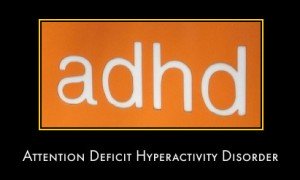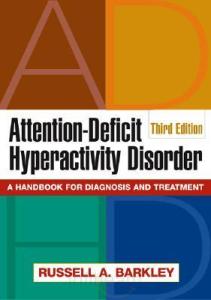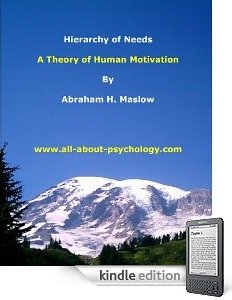|
Attention Deficit Hyperactivity Disorder ADHD (Page 2)Thinking About Becoming A Psychology Student? Find A Psychology School Near YouAttention Deficit Hyperactivity Disorder ADHD
(Photo Credit: Kelly Smith) The following information is provided courtesy of The National Institute of mental Health. How is ADHD Diagnosed?Children mature at different rates and have different personalities, temperaments, and energy levels. Most children get distracted, act impulsively, and struggle to concentrate at one time or another. Sometimes, these normal factors may be mistaken for ADHD. ADHD symptoms usually appear early in life, often between the ages of 3 and 6, and because symptoms vary from person to person, the disorder can be hard to diagnose. Parents may first notice that their child loses interest in things sooner than other children, or seems constantly "out of control." Often, teachers notice the symptoms first, when a child has trouble following rules, or frequently "spaces out" in the classroom or on the playground. No single test can diagnose a child as having ADHD. Instead, a licensed health professional needs to gather information about the child, and his or her behavior and environment. A family may want to first talk with the child's pediatrician. Some pediatricians can assess the child themselves, but many will refer the family to a mental health specialist with experience in childhood mental disorders such as ADHD. The pediatrician or mental health specialist will first try to rule out other possibilities for the symptoms. For example, certain situations, events, or health conditions may cause temporary behaviors in a child that seem like ADHD. Between them, the referring pediatrician and specialist will determine if a child: Is experiencing undetected seizures that could be associated with other medical conditions. Has a middle ear infection that is causing hearing problems. Has any undetected hearing or vision problems. Has any medical problems that affect thinking and behavior. Has any learning disabilities. Has anxiety or depression, or other psychiatric problems that might cause ADHD-like symptoms. Has been affected by a significant and sudden change, such as the death of a family member, a divorce, or parent's job loss. A specialist will also check school and medical records for clues, to see if the child's home or school settings appear unusually stressful or disrupted, and gather information from the child's parents and teachers. Coaches, babysitters, and other adults who know the child well also may be consulted. The specialist will also ask: Are the behaviors excessive and long-term, and do they affect all aspects of the child's life? Do they happen more often in this child compared with the child's peers? Are the behaviors a continuous problem or a response to a temporary situation? Do the behaviors occur in several settings or only in one place, such as the playground, classroom, or home? The specialist pays close attention to the child's behavior during different situations. Some situations are highly structured, some have less structure. Others would require the child to keep paying attention. Most children with ADHD are better able to control their behaviors in situations where they are getting individual attention and when they are free to focus on enjoyable activities. These types of situations are less important in the assessment. A child also may be evaluated to see how he or she acts in social situations, and may be given tests of intellectual ability and academic achievement to see if he or she has a learning disability. Finally, if after gathering all this information the child meets the criteria for ADHD, he or she will be diagnosed with the disorder. How is ADHD Treated?Currently available treatments focus on reducing the symptoms of ADHD and improving functioning. Treatments include medication, various types of psychotherapy, education or training, or a combination of treatments. Medications The most common type of medication used for treating ADHD is called a "stimulant." Although it may seem unusual to treat ADHD with a medication considered a stimulant, it actually has a calming effect on children with ADHD. Many types of stimulant medications are available. A few other ADHD medications are non-stimulants and work differently than stimulants. For many children, ADHD medications reduce hyperactivity and impulsivity and improve their ability to focus, work, and learn. Medication also may improve physical coordination. However, a one-size-fits-all approach does not apply for all children with ADHD. What works for one child might not work for another. One child might have side effects with a certain medication, while another child may not. Sometimes several different medications or dosages must be tried before finding one that works for a particular child. Any child taking medications must be monitored closely and carefully by caregivers and doctors. Stimulant medications come in different forms, such as a pill, capsule, liquid, or skin patch. Some medications also come in short-acting, long-acting, or extended release varieties. In each of these varieties, the active ingredient is the same, but it is released differently in the body. Long-acting or extended release forms often allow a child to take the medication just once a day before school, so they don't have to make a daily trip to the school nurse for another dose. Parents and doctors should decide together which medication is best for the child and whether the child needs medication only for school hours or for evenings and weekends, too. ADHD can be diagnosed and medications prescribed by M.D.s (usually a psychiatrist) and in some states also by clinical psychologists, psychiatric nurse practitioners, and advanced psychiatric nurse specialists. Check with your state's licensing agency for specifics. Side Effects of Stimulant MedicationsThe most commonly reported side effects are decreased appetite, sleep problems, anxiety, and irritability. Some children also report mild stomachaches or headaches. Most side effects are minor and disappear over time or if the dosage level is lowered. Decreased appetite. Be sure your child eats healthy meals. If this side effect does not go away, talk to your child's doctor. Also talk to the doctor if you have concerns about your child's growth or weight gain while he or she is taking this medication. Sleep problems. If a child cannot fall asleep, the doctor may prescribe a lower dose of the medication or a shorter-acting form. The doctor might also suggest giving the medication earlier in the day, or stopping the afternoon or evening dose. Adding a prescription for a low dose of an antidepressant or a blood pressure medication called clonidine sometimes helps with sleep problems. A consistent sleep routine that includes relaxing elements like warm milk, soft music, or quiet activities in dim light, may also help. Less common side effects. A few children develop sudden, repetitive movements or sounds called tics. These tics may or may not be noticeable. Changing the medication dosage may make tics go away. Some children also may have a personality change, such as appearing "flat" or without emotion. Talk with your child's doctor if you see any of these side effects. Are Stimulant Medications Safe?Under medical supervision, stimulant medications are considered safe. Stimulants do not make children with ADHD feel high, although some kids report feeling slightly different or "funny." Although some parents worry that stimulant medications may lead to substance abuse or dependence, there is little evidence of this. FDA warning on possible rare side effects In 2007, the FDA required that all makers of ADHD medications develop Patient Medication Guides that contain information about the risks associated with the medications. The guides must alert patients that the medications may lead to possible cardiovascular (heart and blood) or psychiatric problems. The agency undertook this precaution when a review of data found that ADHD patients with existing heart conditions had a slightly higher risk of strokes, heart attacks, and/or sudden death when taking the medications. The review also found a slight increased risk, about 1 in 1,000, for medication-related psychiatric problems, such as hearing voices, having hallucinations, becoming suspicious for no reason, or becoming manic (an overly high mood), even in patients without a history of psychiatric problems. The FDA recommends that any treatment plan for ADHD include an initial health history, including family history, and examination for existing cardiovascular and psychiatric problems. One ADHD medication, the non-stimulant atomoxetine (Strattera), carries another warning. Studies show that children and teenagers who take atomoxetine are more likely to have suicidal thoughts than children and teenagers with ADHD who do not take it. If your child is taking atomoxetine, watch his or her behavior carefully. A child may develop serious symptoms suddenly, so it is important to pay attention to your child's behavior every day. Ask other people who spend a lot of time with your child to tell you if they notice changes in your child's behavior. Call a doctor right away if your child shows any unusual behavior. While taking atomoxetine, your child should see a doctor often, especially at the beginning of treatment, and be sure that your child keeps all appointments with his or her doctor. Do Medications Cure ADHD?Current medications do not cure ADHD. Rather, they control the symptoms for as long as they are taken. Medications can help a child pay attention and complete schoolwork. It is not clear, however, whether medications can help children learn or improve their academic skills. Adding behavioral therapy, counseling, and practical support can help children with ADHD and their families to better cope with everyday problems. Research funded by the National Institute of Mental Health (NIMH) has shown that medication works best when treatment is regularly monitored by the prescribing doctor and the dose is adjusted based on the child's needs. PsychotherapyDifferent types of psychotherapy are used for ADHD. Behavioral therapy aims to help a child change his or her behavior. It might involve practical assistance, such as help organizing tasks or completing schoolwork, or working through emotionally difficult events. Behavioral therapy also teaches a child how to monitor his or her own behavior. Learning to give oneself praise or rewards for acting in a desired way, such as controlling anger or thinking before acting, is another goal of behavioral therapy. Parents and teachers also can give positive or negative feedback for certain behaviors. In addition, clear rules, chore lists, and other structured routines can help a child control his or her behavior. Therapists may teach children social skills, such as how to wait their turn, share toys, ask for help, or respond to teasing. Learning to read facial expressions and the tone of voice in others, and how to respond appropriately can also be part of social skills training. How Can Parents Help?Children with ADHD need guidance and understanding from their parents and teachers to reach their full potential and to succeed in school. Before a child is diagnosed, frustration, blame, and anger may have built up within a family. Parents and children may need special help to overcome bad feelings. Mental health professionals can educate parents about ADHD and how it impacts a family. They also will help the child and his or her parents develop new skills, attitudes, and ways of relating to each other. Parenting skills training helps parents learn how to use a system of rewards and consequences to change a child's behavior. Parents are taught to give immediate and positive feedback for behaviors they want to encourage, and ignore or redirect behaviors they want to discourage. In some cases, the use of "time-outs" may be used when the child's behavior gets out of control. In a time-out, the child is removed from the upsetting situation and sits alone for a short time to calm down. Parents are also encouraged to share a pleasant or relaxing activity with the child, to notice and point out what the child does well, and to praise the child's strengths and abilities. They may also learn to structure situations in more positive ways. For example, they may restrict the number of playmates to one or two, so that their child does not become overstimulated. Or, if the child has trouble completing tasks, parents can help their child divide large tasks into smaller, more manageable steps. Also, parents may benefit from learning stress-management techniques to increase their own ability to deal with frustration, so that they can respond calmly to their child's behavior. Sometimes, the whole family may need therapy. Therapists can help family members find better ways to handle disruptive behaviors and to encourage behavior changes. Finally, support groups help parents and families connect with others who have similar problems and concerns. Groups often meet regularly to share frustrations and successes, to exchange information about recommended specialists and strategies, and to talk with experts. Tips to Help Kids Stay Organized and Follow DirectionsSchedule. Keep the same routine every day, from wake-up time to bedtime. Include time for homework, outdoor play, and indoor activities. Keep the schedule on the refrigerator or on a bulletin board in the kitchen. Write changes on the schedule as far in advance as possible. Organize everyday items. Have a place for everything, and keep everything in its place. This includes clothing, backpacks, and toys. Use homework and notebook organizers. Use organizers for school material and supplies. Stress to your child the importance of writing down assignments and bringing home the necessary books. Be clear and consistent. Children with ADHD need consistent rules they can understand and follow. Give praise or rewards when rules are followed. Children with ADHD often receive and expect criticism. Look for good behavior, and praise it. How is ADHD Treated in Adults?Much like children with the disorder, adults with ADHD are treated with medication, psychotherapy, or a combination of treatments. Medications. ADHD medications, including extended-release forms, often are prescribed for adults with ADHD, but not all of these medications are approved for adults. However, those not approved for adults still may be prescribed by a doctor on an "off-label" basis. Although not FDA-approved specifically for the treatment of ADHD, antidepressants are sometimes used to treat adults with ADHD. Older antidepressants, called tricyclics, sometimes are used because they, like stimulants, affect the brain chemicals norepinephrine and dopamine. A newer antidepressant, venlafaxine (Effexor), also may be prescribed for its effect on the brain chemical norepinephrine. And in recent clinical trials, the antidepressant bupropion (Wellbutrin), which affects the brain chemical dopamine, showed benefits for adults with ADHD. Adult prescriptions for stimulants and other medications require special considerations. For example, adults often require other medications for physical problems, such as diabetes or high blood pressure, or for anxiety and depression. Some of these medications may interact badly with stimulants. An adult with ADHD should discuss potential medication options with his or her doctor. These and other issues must be taken into account when a medication is prescribed. Education and psychotherapy. A professional counselor or therapist can help an adult with ADHD learn how to organize his or her life with tools such as a large calendar or date book, lists, reminder notes, and by assigning a special place for keys, bills, and paperwork. Large tasks can be broken down into more manageable, smaller steps so that completing each part of the task provides a sense of accomplishment. Psychotherapy, including cognitive behavioral therapy, also can help change one's poor self-image by examining the experiences that produced it. The therapist encourages the adult with ADHD to adjust to the life changes that come with treatment, such as thinking before acting, or resisting the urge to take unnecessary risks. What Efforts Are Under Way To Improve Treatment?This is an exciting time in ADHD research. The expansion of knowledge in genetics, brain imaging, and behavioral research is leading to a better understanding of the causes of the disorder, how to prevent it, and how to develop more effective treatments for all age groups. NIMH has studied ADHD treatments for school-aged children in a large-scale, long-term study called the Multimodal Treatment Study of Children with ADHD (MTA study). NIMH also funded the Preschoolers with ADHD Treatment Study (PATS), which involved more than 300 preschoolers who had been diagnosed with ADHD. The study found that low doses of the stimulant methylphenidate are safe and effective for preschoolers, but the children are more sensitive to the side effects of the medication, including slower than average growth rates. Therefore, preschoolers should be closely monitored while taking ADHD medications. PATS is also looking at the genes of the preschoolers, to see if specific genes affected how the children responded to methylphenidate. Future results may help scientists link variations in genes to differences in how people respond to ADHD medications. For now, the study provides valuable insights into ADHD. Other NIMH-sponsored clinical trials on children and adults with ADHD are under way. In addition, NIMH-sponsored scientists continue to look for the biological basis of ADHD, and how differences in genes and brain structure and function may combine with life experiences to produce the disorder. More InformationSee following link for information on what ADHD is, symptoms of ADHD in children, ADHD in Adults and what causes ADHD? Attention Deficit Hyperactivity Disorder: Page 1 Essential Attention Deficit Hyperactivity Disorder ADHD ReadingAttention Deficit Hyperactivity Disorder, Third Edition: A Handbook for Diagnosis and Treatment by Russell A. Barkley PhD
Book Description Now in a revised and expanded third edition, this handbook presents the latest knowledge on the nature, diagnosis, assessment, and treatment of Attention-Deficit/Hyperactivity Disorder (ADHD). Provided are state-of-the-art guidelines for understanding and managing the challenges ADHD poses to children, adolescents, and adults in a range of settings. Featuring a new chapter on combined therapies, this book is the most comprehensive, authoritative, and up-to-date work in the field. See following link for more details: Attention-Deficit Hyperactivity Disorder, Third Edition: A Handbook for Diagnosis and Treatment Classic Articles All Psychology Students Should Read
This special Kindle collection consists of the most influential, infamous and iconic research articles ever published in the history of psychology. See following link for full details. The Psychology Classics Kindle Collection Go Back To The Main Mental Health Page Go From Attention Deficit Hyperactivity Disorder ADHD Page 2 Back To The Home Page
|







